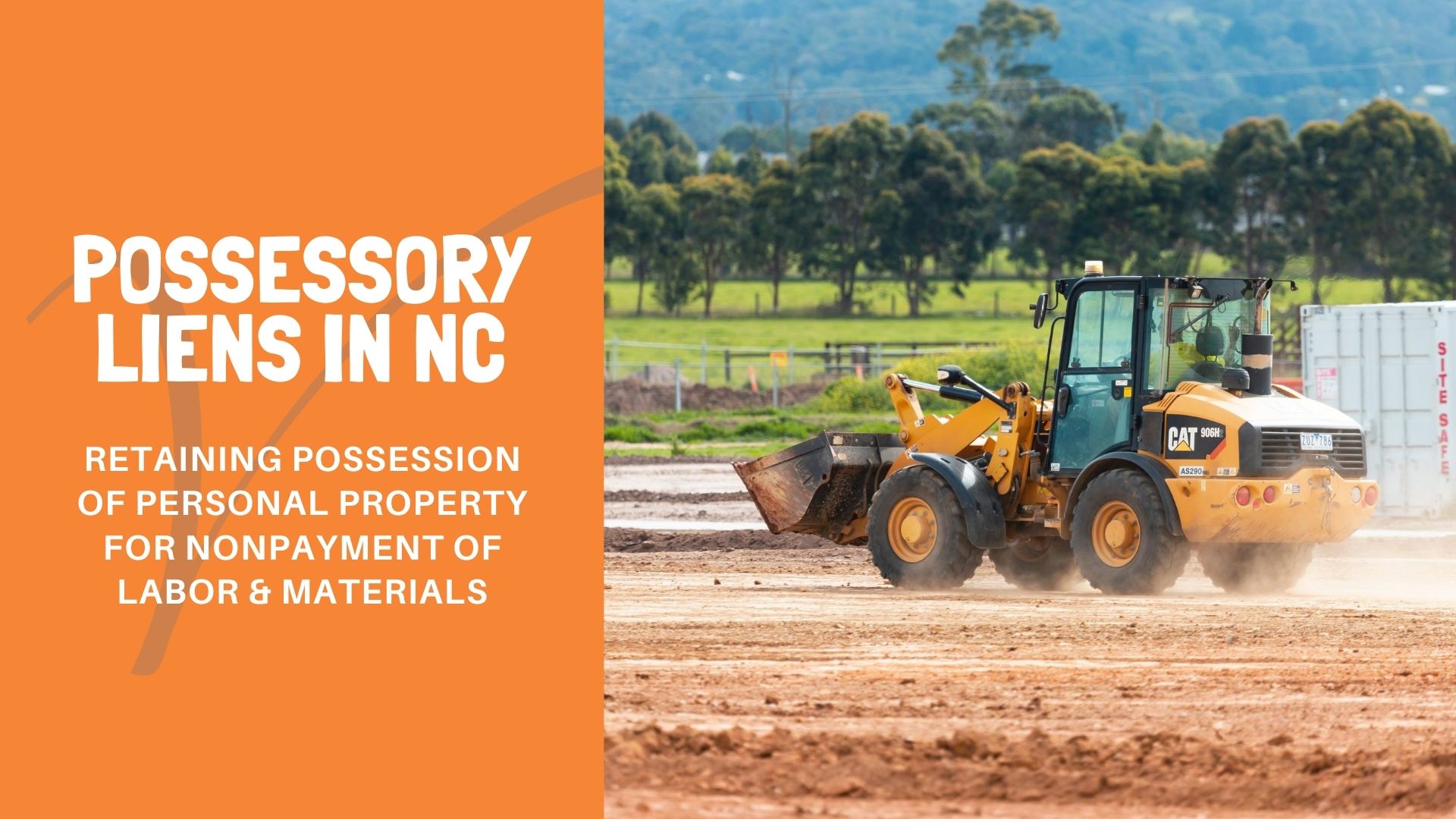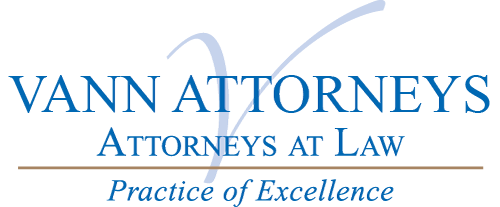Possessory Liens in North Carolina Retaining Possession of Personal Property for Nonpayment of Labor & Materials
By James R. Vann
Attorney at Law

We get quite a few questions on a regular basis where someone has provided labor and/or parts and service to a piece of construction equipment, motorized vehicle and now even electric vehicles and you have not been paid. What should you do? Is it possible that you can keep the equipment or sell it, even if the title owner was not the person who asked you to repair it?
Possessory Liens on Personal Property in North Carolina
North Carolina law provides a means whereby a person who improves, stores, or invests labor or materials in personal property may be entitled to keep the property for a certain length of time, and even sell the property if the bill remains unpaid. These statutes codify the common law principle that a mechanic has a possessory interest in a vehicle left in his care by the owner or legal possessor and in which the mechanic has invested labor and materials. This possessory interest manifests a balancing of the competing interests between ownership rights and the right of a mechanic to have available security for the service rendered. North Carolina’s lien law regarding personal property depends in part upon the nature of the property at issue and the person with whom you are dealing.
Classification of the Property
Chapter 44A of the North Carolina General Statutes sets out different procedures for possessory liens depending on the character of the property at issue. For purposes of this article, we will only cover the portions dealing with motor vehicles and property.
Generally, any person who does work on personal property other than a motor vehicle in the ordinary course of business is limited in the amount that may be claimed as a lien. The amount of the lien is limited to the lesser of (1) the reasonable charges for the services and materials; or (2) the contract price; or (3) one hundred dollars ($100.00) if the lienor dealt with someone other than the owner of the property and who is otherwise entitled or entrusted with possession of the property. In other words, if you dealt with the owner of the property, your lien will only be limited to the lesser of the contract price or the reasonable charges for the work you performed and materials you supplied. However, if you dealt with someone other than the owner, your lien will most likely be limited to $100.00, and the property may be quickly recovered through judicial order once that amount has been deposited with the Clerk of Court.
Statutory Definition of Motor Vehicle
Chapter 44A of the North Carolina General Statutes incorporates the definition of “motor vehicle” as set forth in Chapter 20, relating to the Division of Motor Vehicles. “Motor vehicle” is defined as “[e]very vehicle which is self-propelled and every vehicle designed to run upon the highways which is pulled by a self-propelled vehicle” (emphasis added). For illustrative purposes, although trailers and mobile homes are obviously not self propelled, they still meet the definition of being a motor vehicle because they were designed to run on the highway when pulled by another vehicle. A recent North Carolina case emphasized the word “designed” as found in the statute: the Court held that even a mobile home that has been attached to the land is still considered to be a motor vehicle since it was originally designed to run upon the highway.
Most construction equipment is self-propelled and therefore should fit the definition as being a motor vehicle. This definition is not limited to vehicles required to be registered with the Department of Motor Vehicles.
General Procedure for Possessory Liens Against Motor Vehicles
Generally, any person who repairs, services, tows, or stores motor vehicles in the ordinary course of business has a statutory, possessory lien upon that motor vehicle for reasonable charges for such work. In other words, your lien is not limited other than by the amount that is reasonable for the work performed, whether you are dealing with an owner or a legal possessor. This provision also allows you a lien for the full amount of your services if you have performed the work pursuant to a subcontract.
If your bill has not been paid for 30 days, you may enforce the lien by public or private sale. For towing and storage charges only, you only need to wait 10 days. Additional provisions that deal specifically with storage charges are set forth in the statute.
Motor Vehicles Required to Be Registered
You must send notice to DMV that a lien is asserted and a sale is proposed if the property is a motor vehicle that is required to be registered. DMV in turn will send out a notice to the person having legal title to the property, as well as others claiming an interest in the property, within 15 days of your notice of intent to enforce the lien. This notice sets forth specific information as required by statute and informs the recipient that the recipient has a right to a judicial hearing at which time the validity of the lien will be determined before a sale takes place. If the recipient fails to notify DMV by certified or registered mail, return receipt requested, within 10 days of receipt that hearing is desired, the recipient has waived the right to a judicial determination. DMV will notify you in this event, and you may proceed to enforce the lien by public or private sale.
If DMV notifies you that its notice to the recipient has been returned as undeliverable, or if it cannot ascertain the name of the person having legal title to the vehicle and the property is worth less than $800, you may institute a special proceeding for authorization to sell the vehicle. Special proceedings are heard before the Clerk of Superior Court in the county where the vehicle is located.
Motor Vehicles Not Required to Be Registered
In the event the property upon which your lien is claimed is not a motor vehicle required to be registered, you must send a notice to the person having legal title and to the person with whom you dealt if different from the person having legal title. This notice must set forth very specific information as required by statute and failure to comply with the statute may subject you to a one hundred dollar penalty, actual damages, and attorney=s fees. Additionally, the sale of the vehicle will most likely be set aside.
If the recipient fails to notify you within 10 days that a hearing is desired, that right will be waived and a public or private sale may proceed.
Termination of Lien
The possessory lien on personal property terminates when the property is voluntarily relinquished. If the owner or other legal possessor writes you a bad check or otherwise removes the liened property without your permission, you may recover the property from that person by judicial process. If, however, you voluntarily return the property you will lose your right to claim or enforce a lien on the property.
Notice of Sale
The statute requires that certain detailed procedures be followed before a public or private sale of the property takes place. The statute provides that certain items be included in the Notice of Sale, that the sale be advertised if the property is worth more than a specified dollar amount and addresses who must receive notice of the sale. Additionally, the statute sets forth different requirements for public and private sales. Generally, however, notice must be sent to DMV and to all persons claiming an interest in the property at least 20 days prior to the sale. The sale also must be advertised according to statute unless the property falls into an exception.
Conclusion
The statutory provisions regarding possessory liens on personal property are fairly intricate and therefore, legal advice is recommended to ensure proper compliance. Many creditors realize that collecting a judgment is sometimes a difficult task; having the leverage available to coerce immediate payment from an unwilling debtor is an essential collections tool.
While this article is meant to be as informative as possible, legal advice is recommended since every fact situation raises different legal issues. Therefore, if you have a specific question or a recurring specific set of facts that raises legal questions, legal counsel should be consulted.
Wisdom, Experience, Results
Learn More from Vann Attorneys
Vann Attorneys stands ready to meet the diverse needs of clients ranging from individuals to privately held family businesses to corporations with national distribution. The firm represents clients throughout North Carolina and the United States. We periodically publish content that is relavant to our clients and community. Keep reading our 'News & Events' page on the topics most important to you and your business.
Proven
Experience on
Your Side
Leave a message
Raleigh Office
RALEIGH HOURS
| Mon | 8am - 5pm |
|---|---|
| Tues | 8am - 5pm |
| Wed | 8am - 5pm |
| Thurs | 8am - 5pm |
| Fri | 8am - 5pm |
Charlotte Office
CHARLOTTE HOURS
| Mon | 8am - 5pm |
|---|---|
| Tues | 8am - 5pm |
| Wed | 8am - 5pm |
| Thurs | 8am - 5pm |
| Fri | 8am - 5pm |



